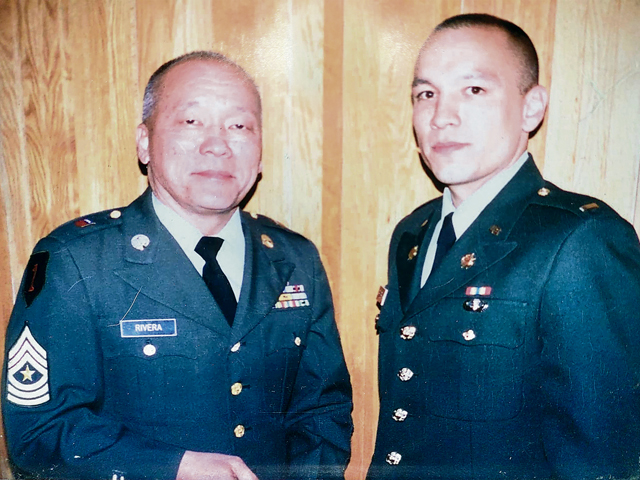
Army Heritage Month is a time to recognize and honor the diversity of Soldiers within the United States Army. It is celebrated in June, centered around the Army’s June 14th birthday. The U.S. Army is committed to cultivating diversity within its ranks, and all Soldiers take the same oath to serve and protect the U.S. and its citizens.
“The Army is an organization that has been around for over 247 years and is here to protect our fellow Americans from any, and all threats, foreign and domestic,” said Lt. Col. Matthew Rivera, commander of 39th Transportation Battalion, 16th Sustainment Brigade, 21st Theater Sustainment Command.
“We’re one of 65 professional armies in the world that takes an oath to an ideal, not a specific thing or person.”
Rivera and his family have a history of serving in the military and proudly display the American flag. According to Rivera, they appreciate and honor those who have served and are currently serving. They support the Veterans of Foreign Wars as well as the nonprofit organization of U.S. War Veterans known as the American Legion.
Rivera’s parents were enlisted and met on active duty in the U.S. Army. His father retired after 24 years as a sergeant major and his mother completed her career after her first enlistment. During the Vietnam War, his uncle was drafted from the Island of Guam and both of his grandparents fought in the Japanese occupation of Guam during World War II.
In 1944, Rivera’s grandfather, Ignacio Rivera, was part of the original Guam Combat Patrol, Third Marine Division. The group policed caves, jungles, and swamps throughout Guam in search of Japanese combatants who refused to surrender after World War II. The patrol’s mission was considered one of the most dangerous military combat duties in Guam after the invasion and had multiple casualties.
“We grew up close to military bases and you could always feel a sense of belonging, community, organization, discipline and motivation, all influential in my decision to ultimately serve,” said Rivera.
Commissioned as a second lieutenant in the Army, May 2003, Rivera joined the Army initially because he felt he could do more while studying in the engineering department at the University of Maine. With good grades and progression in his studies, he realized he could “add more to his plate.” He went to the Reserve Officers’ Training Corps, joined the Black Bear Battalion, quickly enrolled in Military Science courses, and joined the active Army two years later.
Rivera said he held some extremely impactful positions during his military career. They were high-intensity and high-stress jobs that forced him out of his comfort zone. One of the jobs he highlighted was working with the 82nd Airborne Division Brigade in Fort Bragg, North Carolina, as the Airborne Division Sustainment Brigade, Support Operations, responsible to the 82nd Deputy Commanding General – Support. He also worked with the 3rd Expeditionary Sustainment Command commander and sustainment brigade commander for the rapid deployment of the Immediate Response Force into the United States Central Command’s area of responsibility, January 2020.
Another memorable job was working in the 597th Transportation Brigade as the Rapid Port Opening Element commander and battalion executive officer at Fort Eustis, Virginia, to conduct a rapid deployment with a Contingency Response Group into Liberia for the Ebola crisis.
“When we push ourselves to get out of our comfort zone we really get a glimpse of what we’re capable of and we can sometimes find a higher sense of focus, creativity, drive and a higher level of efficient task management,” said Rivera. “That internal push allows us to find skills we never knew we had.”
Rivera experienced that push during Operation Allies Refuge and Operation Allies Welcome, the United State’s historic airlift evacuation out of Afghanistan, in the fall of 2021. During what he calls one of the most challenging and rewarding jobs of his career, Rivera led his battalion, and was the lead element on the ground for the Army in Germany, taking care of more than 8,000 Afghan travelers at Rhine Ordnance Barracks in Kaiserslautern.
In a previous interview, Rivera spoke about what it took to lead the Task Force Home Command and Control Headquarters in support of Operation Allies Welcome. The mission required guidance and resources to care for thousands of arriving Afghan travelers during a global pandemic. This mission tested his problem-solving skills which included balancing the health, welfare, lodging, safety, and accommodations of the travelers.
“We are responsible for the health and welfare of all arriving Afghan travelers,” said Rivera. “Our primary focus is to provide suitable temporary lodging in a safe and dignified manner while setting conditions for their successful transition to their next destination, which for the majority of the travelers will be the U.S. The demographics vary by culture, gender, language, tribes, and marital status. We want to accommodate each demographic as best we can.”
Serving and conducting challenging operations in new environments has been par for the course for Service Members in the Rivera family, and most Soldiers serving in the Army today.
For many Soldiers, one of the perks of being in the U.S. Army is the opportunity to travel to different places, meet new people, and have new experiences. Along their career paths, the most successful Soldiers strengthen their toolkits by adapting and overcoming new obstacles. Service Members from different backgrounds learn from each other. Sharing their stories and experiences builds a greater understanding of what it means to be “Stronger Together,” the motto of the United States Army Europe and Africa command, within which Rivera proudly serves.
“We have a very diverse Army and a long history of defending our nation and our beliefs,” said Rivera. “It’s important to celebrate Army Heritage month in order to recognize and continue to educate our future generations of the men and women that came before us blazing the trail to where we are today.”


